Location
Our Washington Location
Our inpatient facility is located in Washington, and will serve Washington state. It will provide a safe & therapeutic environment for both our staff and patients.
- Edmonds
7416 212th St SW,
Edmonds, WA 98026
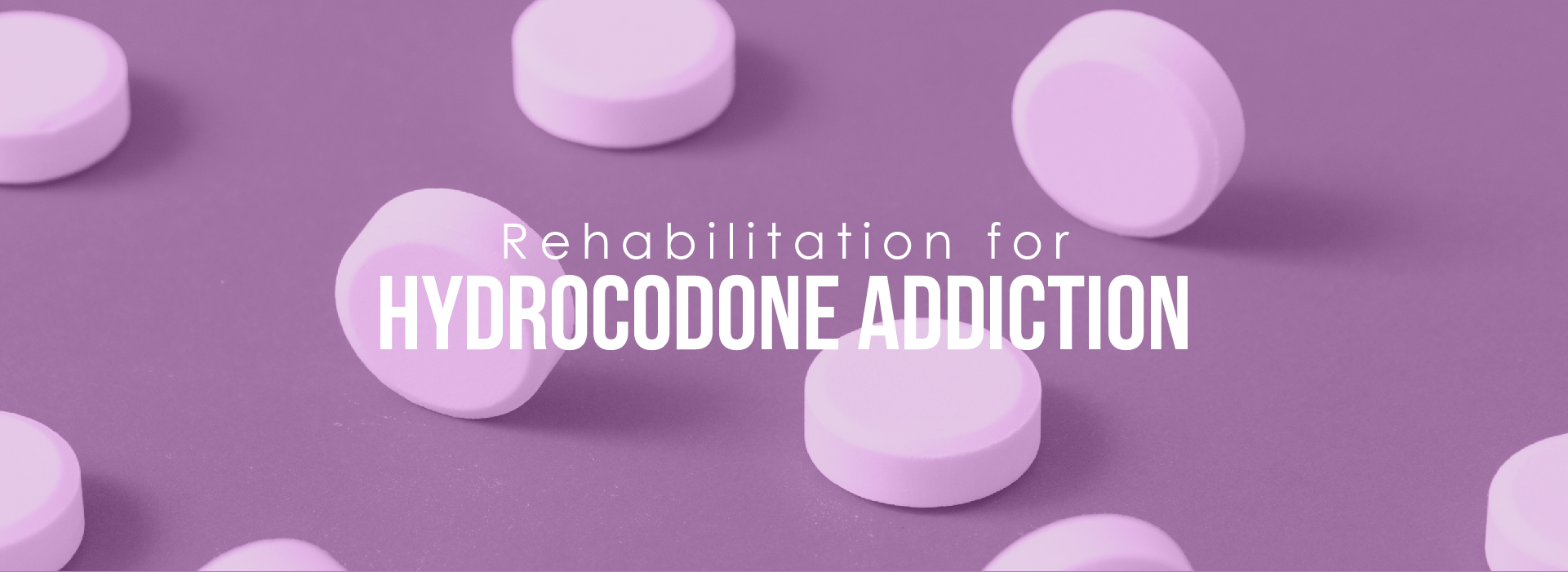
Hydrocodone addiction is a problem across the United States. You may have received the drug as a prescription to manage pain after surgery or an injury. However, you may not have been aware of how addictive it is.
Hydrocodone is one of the most highly prescribed opiates on the market. The number of prescriptions for this medication has increased in recent years. According to statistics,132,000,000 prescriptions were written in 2016, up from 124,200,000 in 2008. With increased access to the drug, it becomes easier for people to obtain it either for pain or to get high.
It is a medication that is given to help with pain, and it is never intended to be used long-term. However, because it is an opioid, some people may become addicted even if they take it as prescribed.
If you are or believe you could be addicted to hydrocodone, there is hope and help. There are addiction treatments available to you that can help you fight this disease.
Keep reading to find out the answers to these questions:
Because hydrocodone is a prescription medication, it’s usually seen as harmless. However, it is not harmless at all, and some of the short and long-term effects of this medication can be dangerous. Short term effects may include:
Long term effects may include:
When you stop taking Hydrocodone, your body responds quickly because it’s missing something it’s used to having. Inpatient drug rehab offers you support and guidance while helping you stop this medication slowly to avoid any serious complications.
You may also experience side effects from taking the drug from the first use. Even if you’re following the doctor’s prescription, you may find that you can’t tolerate the drug or that you have different degrees of discomfort. Some of the more common side effects include the following:
You may also develop an infection of the upper respiratory tract which may require antibiotics for treatment.
If you experience any of the following, you need to seek medical attention right away:
You don’t want to ignore any of these warning signs. It’s important to get help right away.
It’s possible to overdose on this drug, especially if you take a pill and crush it or mix it with liquid for injection. It gets into your bloodstream faster, and it can be lethal, especially if you’re doing this with an extended release formula.
Symptoms of an overdose on Hydrocodone include the following:
You may experience confusion and depression along with ringing in the ears and blurry vision. Nausea and vomiting are additional signs of overuse, which could lead to a serious overdose. If not treated quickly, an overdose can result in death.
Once you get medical help, they will provide airway support if necessary, such as a breathing tube and oxygen. They may give activated charcoal to help absorb the excess drug. You may need blood tests, an X-ray, CT or EKG to check for organ damage or issues.
Combining other drugs with Hydrocodone is dangerous but all too common for drug abusers. It may be combined with alcohol, other opioids like heroin or morphine, antipsychotic medications, or antidepressants.
When you mix this drug with alcohol, you may have a serious impairment of judgment and be unable to make good decisions. This not only includes drinking alcohol but even the amount found in cough syrups and other medications can cause problems.
Combining the drug with other drugs which cause a depression of the central nervous system can lead to respiratory conditions which are life-threatening. It can slow down your systems to the point where they cannot keep you alive. It also makes you less alert and drowsy. You may be unable to function, especially if you take other medications which make you feel sleepy. You may go into a coma or be unable to respond quickly enough if you’re operating machinery or driving a car, which can lead to a serious accident and injuries.
“I am one of the lucky ones,” she wrote. “Let’s work harder, look closer, and do everything we can not to enable and in doing so, disable, our loved ones who are ill.”
~Jamie Lee Curits on struggling with addiction herself and calling people to action to bring an end to this disease.
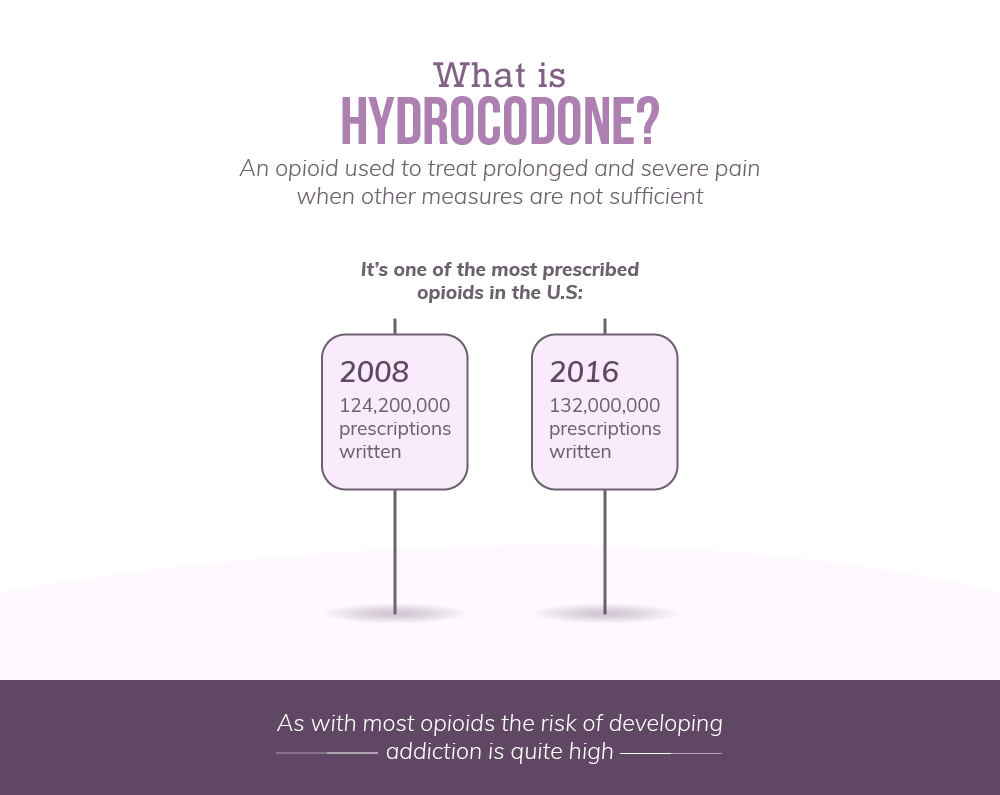
If you’ve become addicted to Hydrocodone – either because you knew you were abusing it or because you have been taking it for too long and now you can’t stop – it’s important to get professional help. Hydrocodone carries a lot of dangerous short and long-term side effects, and it’s crucial to stop taking it under professional supervision. Professional opioid detox and drug rehab offers you the assistance you need in a medical and professional environment where you can be safe as you stop.
If you are unsure whether you are addicted to hydrocodone or not, here are some signs of drug addiction:
If you are experiencing even one of these symptoms of addiction, it’s time to seek medical help. Getting medical attention for your addiction as early as possible gives you the best chances of a quick, successful recovery.
If you wonder whether you suffer from such an addiction, you can take a quiz to help you determine where you are in this scenario. You can also seek out help from a drug rehab center whether you are dependent or just abusing the drug.
When you take this drug as a prescription, your doctor will probably decrease the dosage slowly rather than taking you off it right away. If you try to stop taking it all at once, you may find you become anxious and have difficulty sleeping. You may start to sweat uncontrollably and have muscle aches. You may become irritable. If the symptoms become too severe, you’ll try to find a way to get more of the drug so you can stop them.
Detox is the process of cleansing the drug and its toxins from the system. If you are abusing Hydrocodone, you’ll need to go through the detox process. It’s best to not try it on your own. Instead, seek out a detox facility where you can receive 24-hour support until you’re finished with the process.
Because Hydrocodone is an opiate, you may experience serious side effects. For some, they want to use medical detox to help them through the process. With this method, you take a medication which is designed to help reduce or even eliminate the symptoms of withdrawal. The down side of this approach is many of these medications also have addictive properties and must be monitored closely to prevent a secondary addiction. It slows down the detox process and makes treatment take longer.
Another option is holistic detox. With this method, the focus is on helping you get healthy through nutrition and exercise so your body can fight the withdrawal symptoms naturally. Healthy eating enables you to get the nutrients you need which can enable your body to fight off those symptoms. Exercise increases the feel-good hormones in your brain, which will mimic the effect of the drug but in a natural way.
If you’re interested in detoxing so you can start drug addiction treatment, consider your options and find a facility that offers the approach you prefer. You want to think about long-term success and getting healthy from your addiction.
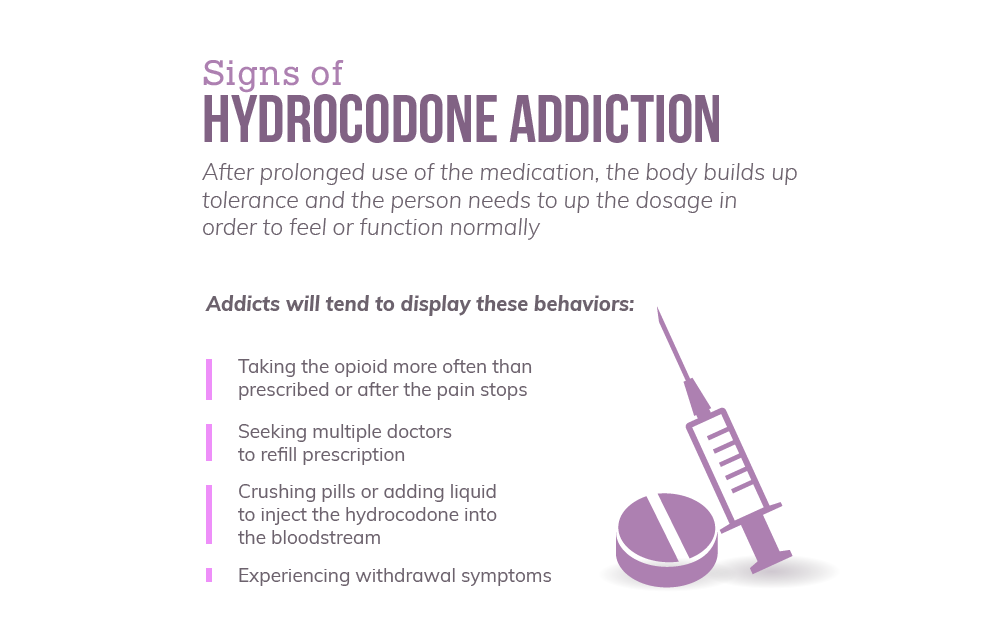
Hydrocodone, like all other opioids, is highly addictive. The first thing you need to do to get on the road to addiction recovery is detoxification.
Detox is always the first step to sobriety for any addictive substance. The process of detoxifying your body allows for it to reset and get used to functioning without the opioid or addictive substance again. Without this step, a relapse is almost guaranteed to happen.
Since hydrocodone is so addictive, your body can easily become dependant on it. This means that when you stop taking it, your body will go through withdrawals symptoms because your body no longer has the substance it has depended on. Withdrawal symptoms vary in severity and can be very uncomfortable. They can range anywhere from muscles aches to vomiting.
Here are some of the withdrawal symptoms you may experience in hydrocodone detox:
In most cases, withdrawal symptoms will last 5-7 days. But, if you’re mixing Hydrocodone with other substances, it could take longer than a week to fully detox.
For most hydrocodone, the effects of the drug last about 4-6 hours after it is taken. After that time is up, withdrawal symptoms will set in. This timeline can give you an idea of what to expect in your detox experience.
4-6 hours after last hydrocodone use: Euphoric high
6-12 hours after: High wears off and withdrawal symptoms (listed above) begin.
72 hours after: Peak of withdrawal symptoms and extreme discomfort occur
A week after: For some people, withdrawal symptoms may subside. If you were a very frequent user or you mixed hydrocodone with other substances, it may take longer.
A month after: Physical drug cravings and emotional side effects may persist for up to a month after last use
Each detox treatment facility has a different evaluation process and the length of detox stay can be different for each person, but generally speaking detox treatment will last about a week. There are various factors that go into determining the length of a person’s detox, including: weight, age, dosage and length of time since last use.
If your addiction and/or withdrawal symptoms are severe, your hydrocodone detox team may choose to partially hospitalize you so you can be closely monitored.
While this timeline shows the physical side of what opioid drug detox can look like, the effects of drug addiction will be with you for life. If you are an addict, the physiological addiction will not go away after a month. It will continue to be a struggle that you need to work through, which is why drug rehab is such an important follow-up to detox.
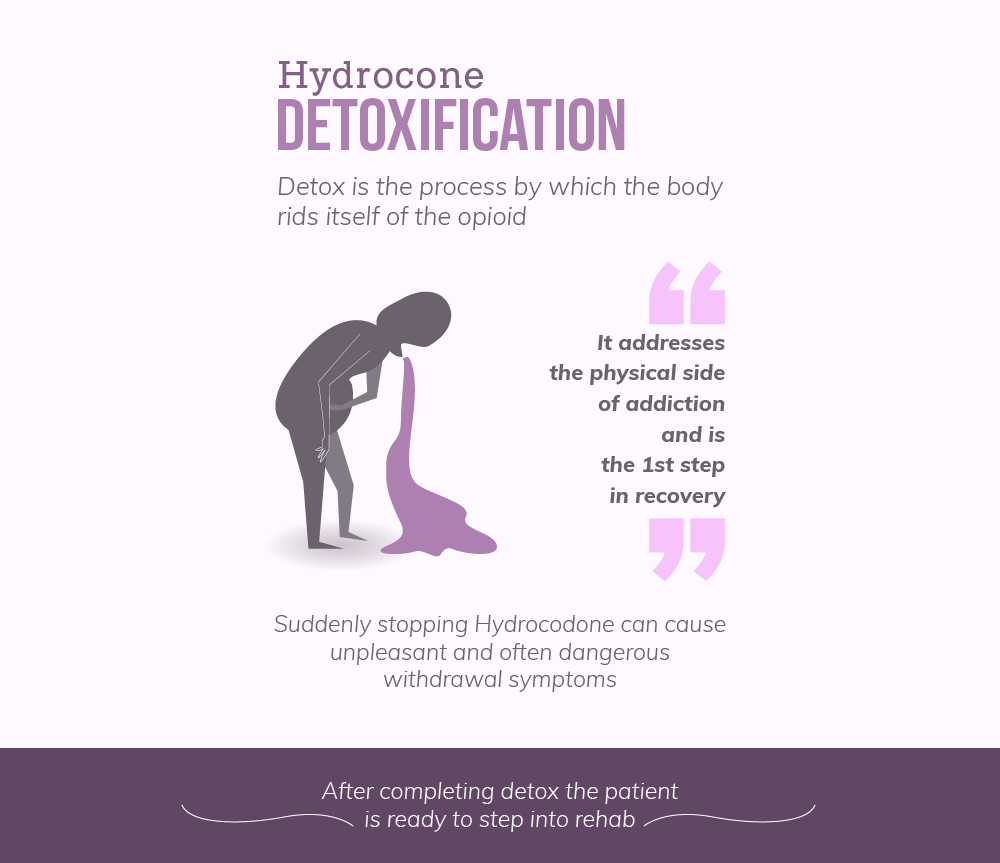
First things first - it is always recommended to undergo detox with a medical professional. A successful detox will give you the start you need for an easier road to recovery. Some people attempt to detox on their own at home, which is NOT advised. Without the supervision of a medical professional, you are much more likely to relapse. Detox symptoms can also be intense on your body, and a medical professional will be able to assist you during the process.
With most addictive substance, you will have two options for a medically supervised detox treatment - inpatient and outpatient.
At an inpatient detox facility, you will live at the facility during the entire detox period. Usually inpatient facilities are found to be more successful because you can be medically supervised 24/7 and you do not have access to more hydrocodone or any other addictive substance.
The medical professional will monitor vital signs during the whole process, and will help keep you comfortable and safe. Professionals can also help make sure that your detox period is as short as possible so you won’t have to experience unnecessary, prolonged discomfort.
An outpatient facility also provides medically supervised detox, but instead of living in the facility, you live in your home and travel to the facility for check-ups and treatment. This is a much better option than attempting to detox on your own, outpatient detox means that you will be traveling outside of the facility where opioids, alcohol, and other addictive substances are available.
For hydrocodone specifically, there are also medications that are used to treat hydrocodone addiction. Some of these medications include:
While these medications can be helpful, again it is very important that they are only given and monitored by a trained medical professional. Improper use of these drugs can lead to further addiction and abuse, which can lead to serious health consequences.
If you suffer from an addiction to a prescription drug like Hydrocodone, you may think you don’t need rehab. Once you’ve gone through detox, you may feel like you’re ready to get back to your life. While this may be the case, often a person relapses because they failed to follow up with drug addiction treatment.
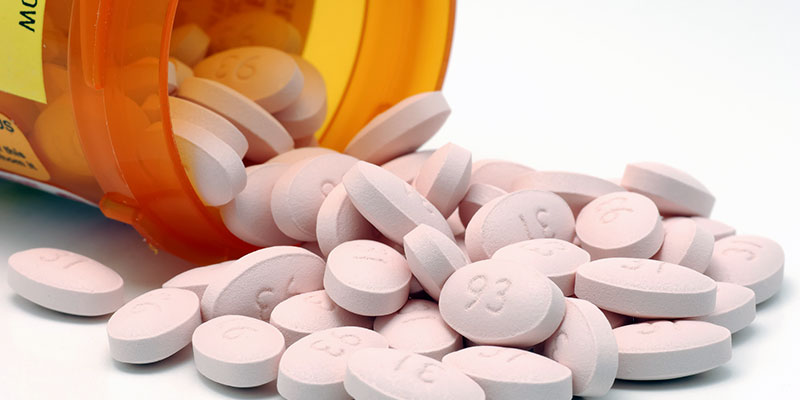
Once you complete detox, you’ll begin a rehab program. It can last a few days, as many as 30 days or sometimes even longer if you have a serious opioid addiction. Many times, a person will complete initial treatment only to continue with a 12-step program or other aftercare therapy. Studies show that the longer a person spends in some type of treatment program, the less their chances of relapsing.
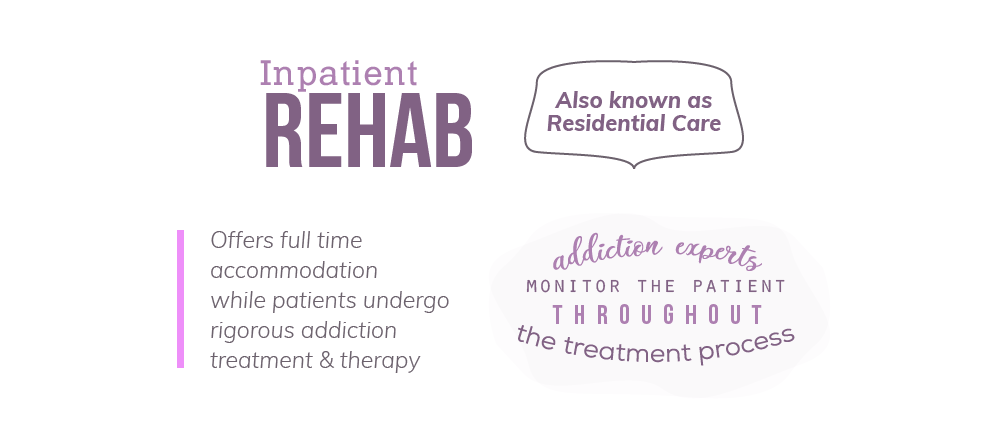
You have several options when it comes to getting help for your addiction. If you’ve been a drug addict for many years or have tried therapy in the past and failed, you may need to attend a residential treatment center. This program allows you to stay for several weeks or months and may even transition you to a sober living home before you finish treatment.
Inpatient treatment centers have been proven to be more effective in the long-term because it provides you with around-the-clock care, a support community, and freedom from the temptation of buying or using again. It completely removes you from your unhealthy environment and gives you the time and space you need to heal and recover.
Without this crucial step, you would be sent back into the life you knew before your detox, which would normally involve hydrocodone use. Inpatient rehab treatment provides you with the tools you need to learn how to live without the drug for the long-term.
Inpatient rehab is usually very structured, with planned activities throughout the day to keep people busy and active. Daily activities may vary, but most inpatient rehab facilities follow a similar routine to reduce anxiety and uncertainty in their patients.
Mornings: Breakfast and Meetings to Start off the day
Afternoons: Lunch and Intensive Therapy
A healthy lunch marks the middle of the day and gives patients a break from sessions.
After lunch, usually a new series of therapy sessions begin:
Evenings: Dinner and Speakers
Most inpatient rehab facility programs last about a month. This allows for the patient to have enough time to learn about their behaviors and triggers, settle into a new healthy lifestyle, and learn tricks and habits to pave the way for a successful recovery.
Many people can also succeed with outpatient rehab, especially if they are a new addict or only have a light abuse or addiction problem. They can attend therapy a few hours a week and continue with their other responsibilities. It’s the ideal option for someone with a job or with children they can’t leave overnight.
If you have a more serious addiction but still have responsibilities to manage, intensive outpatient treatment may be a viable option. You spend more time in treatment but still get to go home and to work. Instead of a few hours per week, you may go every day or even spend several hours each day in therapy.
Day Programs
Day programs give the highest amount of care and structure that you can find in an outpatient treatment setting. They are an extensive time investment, but give you the most support while still allowing you to live off-site. Day program patients commit to going to the facility 5-7 days a week, for multiple hours each day. The meetings there include therapy, group counseling, as well as specialty therapies.
Intensive Outpatient Programs (IOP)
Intensive outpatient programs work off of specific goals and milestones that are created for each patient to meet. When the milestones are met, the time spent in meetings in the treatment facility decreases. This option is good for a person seeking intense support while still needing to attend to a job, school, or other daily responsibilities.
Continuing Care
Continuing care involves groups you may have heard of like Alcoholics Anonymous or Narcotics Anonymous. These are support groups that meet weekly or biweekly and are led by a trained professional or therapist to walk with people through the struggles of addiction recovery.
When considering what type of program is best for your addiction recovery, you will need to think about how much support you have as well as the negative situations and influences you will encounter if you try to live on your own during this time.
Understand that addiction isn’t a curable disease. Even as a recovering addict, you still have the tendency to become addicted to certain substances. For this reason, you should tell your doctor about any past addictions when they are prescribing pain medication or other drugs for a condition. They may adjust their recommendation or monitor you closely if they are concerned about you developing an addiction.
Our facility at Northpoint Washington is a 28-day inpatient drug rehab facility located in Washington state. This program involves a detox portion, followed by rehab treatment, and then a specialized outpatient treatment plan.
We offer all the benefits of an inpatient treatment at our facility. You will receive individualized medical care 24/7, along with mental health treatment, and a schedule that will allow you to rehabilitate yourself and focus on getting clean.
For the first 7 days (approximately), you will undergo the detox process. We will provide you with specialized medication and therapeutic activities to help minimize they hydrocodone withdrawal symptoms.
We believe that it is very beneficial to complete detox and rehab treatment in the same facility because research shows when the two processes are done together, the chance of a relapse decreases and the chances of staying sober longer increases.
After detox, you will enter the rehab portion of the program. This will address the psychological aspects of drug addiction to get at the root of the reason why you are using. You will learn how to manage your cravings and how to retrain your brain to function without hydrocodone.
Once rehab is completed, we will be sure to set you up for success after you leave out facility. You will be able to apply what you learned in rehab to your daily life at home, and we will provide flexible options for you that will still provide you with the support you need.
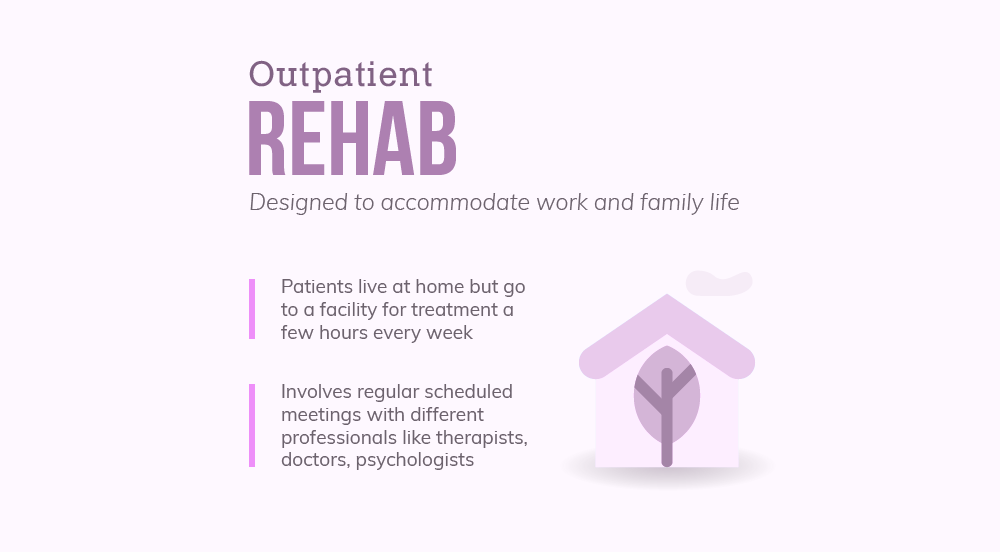
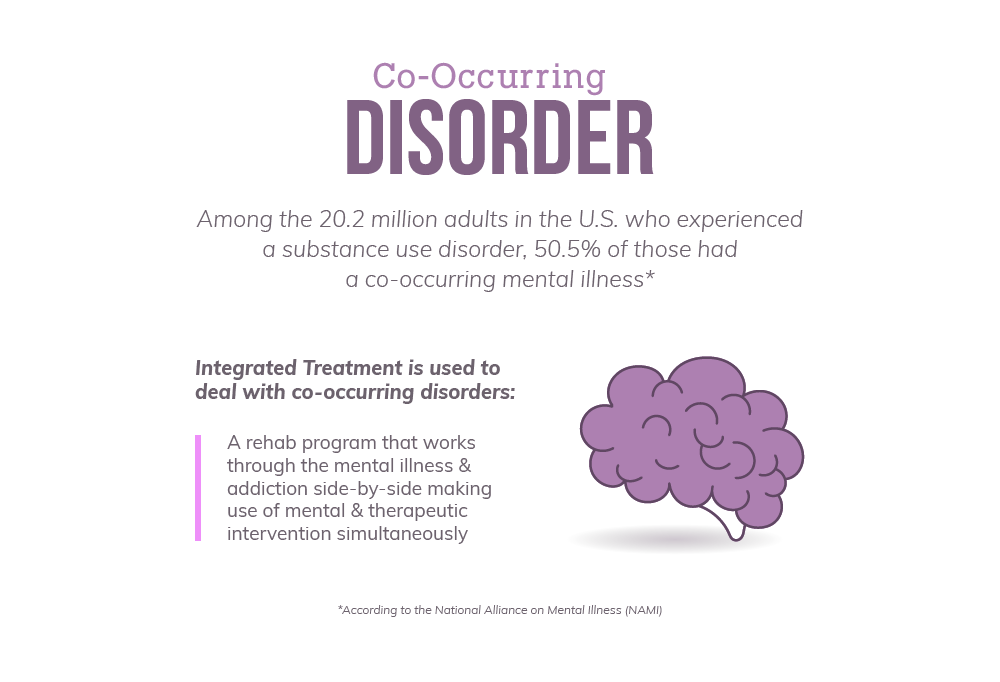
A co-occurring disorder is the term used to describe when someone with a substance abuse disorder also has a mental illness, such as depression, bipolar disorder, OCD, or PTSD. Any combination of substance abuse with any mental illness qualifies for a co-occuring disorder diagnosis.
According to the National Alliance on Mental Illness, as many as 1 in 5 Americans struggle with mental illness in some capacity. And, among the 20.2 million adults in the U.S. who experienced a substance use disorder, 50.5% of those had a co-occurring mental illness.
It is fairly common to have a co-occurring disorder, and it is important to treat and care for both the addiction and the mental illness together. The causes and symptoms of addiction and mental illness usually go hand-in-hand, so if you treat one without addressing the other, you will not have a successful outcome.
Some people use drugs like hydrocodone to cope with depression or symptoms of a mental illness, or some may have such a severe addiction problem that it causes or triggers a mental illness. No matter which way it happens, if you think you may have a co-occurring disorder, it is important to seek treatment.
The answer to a co-occurring disorder is called integrated treatment. This specific type of treatment is a comprehensive rehabilitation program that works through your mental illness and addiction side-by-side. When you receive mental and therapeutic intervention for both disorders at the same time, you will be able to manage your mental health disorder symptoms without using drugs to self-medicate and worsen the symptoms.
Integrated treatment combines the fields of addiction treatment and psychiatry to provide total patient care and reduce the chance of a relapse. When mental health professionals and addiction specialist work together, the medication you will receive will help treat symptoms from both disorders. In integrated care, there are no hesitations to prescribing a psychotherapeutic medication. You can also have a more successful group therapy experience if you are grouped with addicts who also have the same mental illness as you, so that you have more people surrounding you who you can relate to.
At Northpoint Washington, we provide services specifically for co-occurring disorders and can provide you with the medication you need to treat both of your disorders at the same time.
Most modern drug treatment centers offer various types of treatment to address their patients’ addictions. It’s important to provide a well-rounded treatment plan so that patients’ needs are met properly. Some of the main types of treatment that are offered include:
You may attend a program that includes alternative treatment as part of your program. You’ll find a variety of options under this category. For instance, a drug rehab center may offer art or music therapy, equine therapy, yoga, journaling and more. These programs help you find new ways to deal with your addiction and handle stress in a positive way so you are less likely to relapse in the future.
Many treatment centers provide a focus on getting the recovering addict healthy, both physically and mentally. You may work with a nutritionist to ensure you’re getting the right vitamins and minerals so you can feel good. This becomes very important because a vast number of addicts eat poorly when they’re using.
Exercise is an important part of these programs as well. It helps you have more energy and feel good. It also enables you to have a more positive outlook on life as it works to reduce the effects of stress.
Most treatment plans will include a combination of programs. They may even be adjusted if you fail to continue moving forward or need more help with recovery. Consider what treatment options are available at the facilities you visit to ensure you find the best one for your addiction recovery.
People with a mental health disorder often turn to drugs as a way to hide the symptoms from family and friends. They are afraid to seek out treatment so they turn to self-medicating to appear normal to others.
Opioids are popular in this scenario because they help you relax while providing that “feel-good” feeling. You may take them if you suffer from depression or anxiety as a way to feel better and be able to participate in your normal activities.
The problem with treating any mental health condition with a drug on your own is you don’t know the correct dosage to take or the right medication to treat the problem. As your body develops a tolerance to the drug, it will take more for you to successfully hide your mental health disorder symptoms. Once you have become addicted to the substance, you may find your symptoms have worsened instead of improving.
Some common mental health conditions paired with drug addiction include the following:
Treating a dual diagnosis is important in addiction recovery. If the mental condition isn’t dealt with, you’re more likely to relapse down the road. You’ll need a therapist who can treat the mental health disorder as well as someone experienced with drug addiction. You will probably attend regular therapy and may be prescribed medication to deal with the mental health disorder.
While having a mental health disorder complicates your drug addiction treatment, you can still have a successful recovery if you find the right program. You want to do your research and locate a center with staff that is experienced in dual diagnosis.
Thinking about paying for a drug rehab treatment for hydrocodone addiction may be daunting, but it’s worth doing in order to get the help you need. Although it can be confusing, if you break it down you might find it more manageable.
The first thing to do is always check with your insurance. You may have full coverage for drug rehab, which would mean your treatment and stay could be free of cost. There could also be partial coverage available to you, depending on your plan.
The cost of drug rehab for hydrocodone will vary from person to person. This cost depends on several factors, including: your type of insurance policy, the type of treatment you’re seeking, length of your treatment, and whether or not you can pay in cash.
Recently, there has been a big push for helping addicts get off drugs. The number of drug users costs taxpayers a lot of money each year. The Centers for Disease Control and Prevention have estimated that the financial cost of prescription opioid misuse is $78.5 billion a year. This is including costs of healthcare, the loss of job productivity, treatment for addiction, and the legal costs. It will benefit everyone to support drug treatment facilities for addicts to help relieve these costs.
Most rehab facilities offer financial aid or have financial plans available. Many also accept a variety of insurance plans depending on the facility and the insurance provider.
Some of the common forms of insurance include:
If you do not have insurance and really cannot afford to pay for rehab, there are free or low-cost facilities available in Washington state. While free or cheap sound good at first, these facilities will not provide the best hydrocodone drug treatment options. It is much better to choose a higher-quality facility that offers a financial plan if you can make that work.
A good-quality rehab facility will give you the tools you need to live a healthy, sober life, which may cost more in the short-run, but will pay off in the long-run. And if you aren’t paying for your drugs, you may find you have extra money to make payments for rehab.
Since there are so many factors that go into rehab costs, it is hard to break down what an average cost for rehab treatment would be. But, we can provide you with a range of the cost of drug rehab in Washington state that you can work off of to get a general idea of the total cost.
If you were just to do detox it costs about $300-$800 per day. The average amount of time it takes to detox is five days. Total payment of detox will cost between $1,500-$4000. If it’s emergency detox, it can cost substantially more.
With hydrocodone specifically, you may be required to take medication during the detox process, and also during the rehab process to ease the pain of withdrawal symptoms. These medications will increase the cost of rehab.
The cost of standard inpatient addiction treatment is around $30,000 per month. Outpatient is around $500 per session. Some of it may be covered through government programs or health insurance. While these clinics will not be as comfortable as luxury treatment facilities, the treatment they offer will still be on-par with that of a luxury facility.
Inpatient treatment costs significantly more (average daily cost of $400-$900) because you are receiving 24-hour care, as well as meals and a place to live. On top of that, they offer a variety of activities and different therapy sessions to fill the day.
Outpatient treatment can be a more affordable option (Average weekly cost of $140 – $500) because you are not living in the treatment center. They don’t have to provide food or housing, so the cost is significantly reduced. While the intensive care of outpatient treatment is the same standard and quality as inpatient treatment, you run the risk of relapse with the accessibility to drugs outside of the facility. You also don’t have all the time and energy you would have with inpatient care to focus on getting better.
If you are totally avoiding rehab because you think it is too expensive, then you need to continue reading. Temporary financial expenses should not be a barrier between you and your long-term health, and these low cost or free options leave you with no excuses for not starting a rehab program.
Here are some of the most common affordable or free options for rehab treatment in WA:
You may now be asking yourself, “if there are so many free or reduced cost rehab options, why would I ever pay for an inpatient rehab program?”
The reason why paying for an inpatient program is worth the money is because research has proven that it is the most effective way to recover, and it yields the most successful results.
While the cost of rehab seems excessive, the cost of your addiction could be costing you even more. For hydrocodone specifically, the average street price per pill runs from $5-$20. This means that if you are severely addictive and take 3 pills daily, that could cost you up to $60 a day. That adds up to $1,800 a month and $21,600 annually.
There are also plenty of additional financial hits you may take as an addict. While being addicted to hydrocodone, it’s very difficult to hold a job. Withdrawal symptoms may make it impossible to work, or you could be fired for your addiction problem. You may think you have a different, unrelated medical issue that you are paying for that would go away if you stopped using.
There are many different variables, but the bottom line is you are paying more for your drug addiction than you may even realize. If you pay for this one time cost that may be a little out of your budget, it could save you a lot of money in the long run by eliminating the cost of addiction.
Trying to end substance abuse by yourself is unsafe and ineffective. Though the one-time cost of rehab may be a lot, what you gain from the experience is priceless. You will gain your freedom, your health, and your life back if you do it right.
For families with loved ones who suffer from hydrocodone addictions, every day is a battle. They are often really worried about a potential overdose, and they’re not sure what to do, or how to help the people they care about. Many times, the addict fails to see a problem, especially if they are abusing a prescription medication. They may tell you they can handle it and stop anytime they want. While you know it’s not true, arguing will probably not change their minds. Instead, you can present information about Hydrocodone to help them see the dangers of this drug.
Your loved one may still not listen to you or be willing to change their ways. You begin to feel frustrated and at a loss on how to help them. If you’re at this point, you might want to consider scheduling intervention services. This is a meeting that takes place in a controlled environment with your loved one, as well as with other friends and family. Together, you talk about the addiction and how it has affected all of your lives, and admission can even be scheduled immediately afterward.
Statistics show that interventions are highly successful. Sometimes an addict will hear the message when it’s presented by multiple people at once. Other times, they are desperate enough to do something about their addiction but didn’t know how before.

Here at Northpoint Washington, we provide all of the above, plus a lot more for our patients while they’re recovering from their addictions. We focus on a holistic approach and offer the opportunity to engage in exercise, hiking and other activities as you work on your recovery. We have a small facility with a low patient to staff ratio which means you get more individualized attention when you need it.
Northpoint Washington offers a 3-phase approach to drug rehab: detox, rehabilitation, and aftercare support. By covering these 3 aspects of recovery, we make sure to guide you through each difficult step of this process. We will assist you in cleansing your body to get you back on track, then training your body and mind to live without the substance while connecting you to other people who are doing the same thing, and then sending you out with tools and support so you can live your life again.
We offer services such as: relapse prevention, integrated treatment and medical intervention, physiatric care and medication for co-occurring disorders, family therapy, behavioral therapy, educational workshops, and group therapy. We believe that these services cover the bases to provide you with all the care and tools you will need to fight your addiction to hydrocodone.

Our admissions coordinators are here to help you get started with treatment the right way. They'll verify your health insurance, help set up travel arrangements, and make sure your transition into treatment is smooth and hassle-free.
[DirectNumber] Contact Us